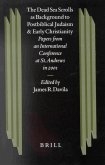The Hekhalot literature is a bizarre conglomeration of Jewish esoteric and revelatory texts in Hebrew and Aramaic, produced sometime between late antiquity and the early Middle Ages and surviving in medieval manuscripts. These texts claims to describe the self-induced spiritual experiences of the "descenders to the chariot" and to reveal the techniques that permitted these magico-religious practitioners to view for themselves Ezekiel's Merkavah as well as to gain control of angels and a supernatural mastery of Torah. Drawing on epigraphic and archaeological evidence from the Middle East, anthropological models, and a wide range of cross-cultural evidence, this book aims to show that the Hekhalot literature preserves the teachings and rituals of real religious functionaries who flourished in late antiquity and who were quite like the functionaries anthopologists call shamans.
Hinweis: Dieser Artikel kann nur an eine deutsche Lieferadresse ausgeliefert werden.
Hinweis: Dieser Artikel kann nur an eine deutsche Lieferadresse ausgeliefert werden.








